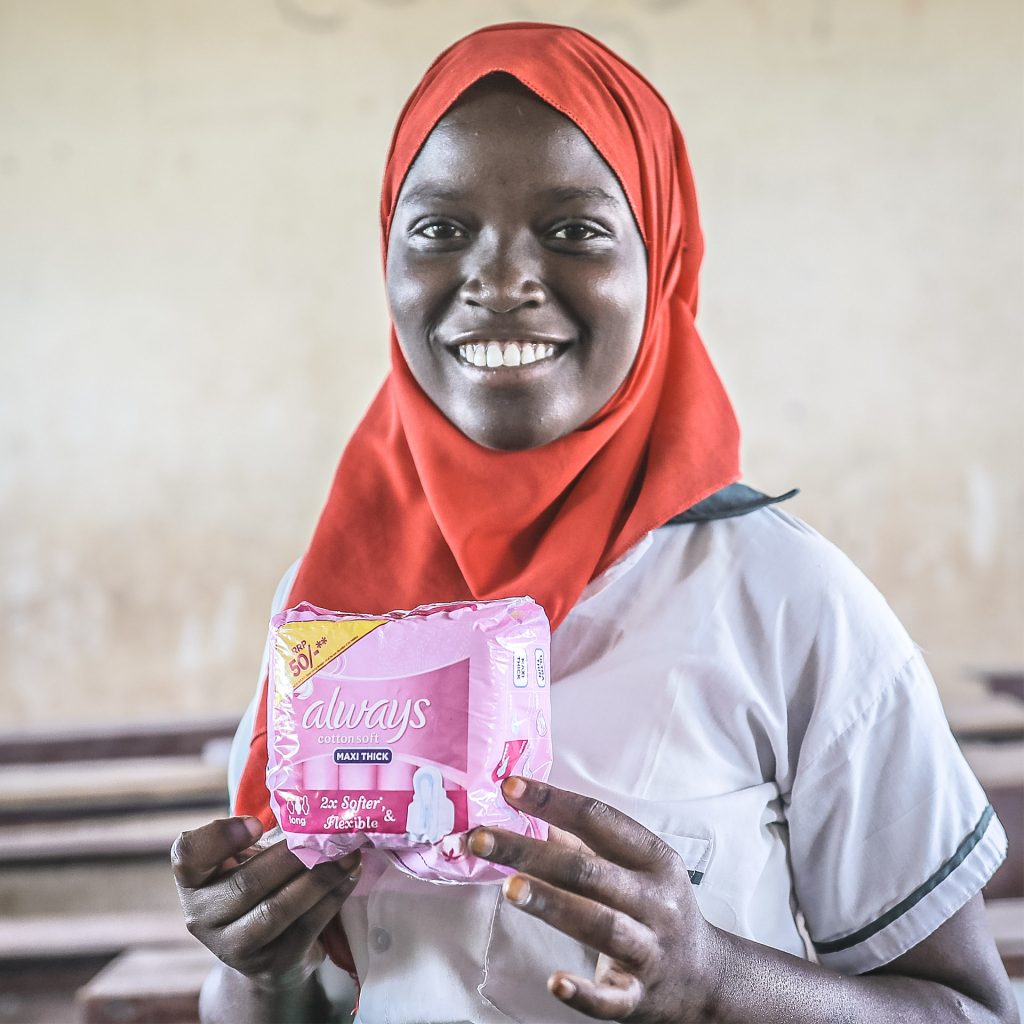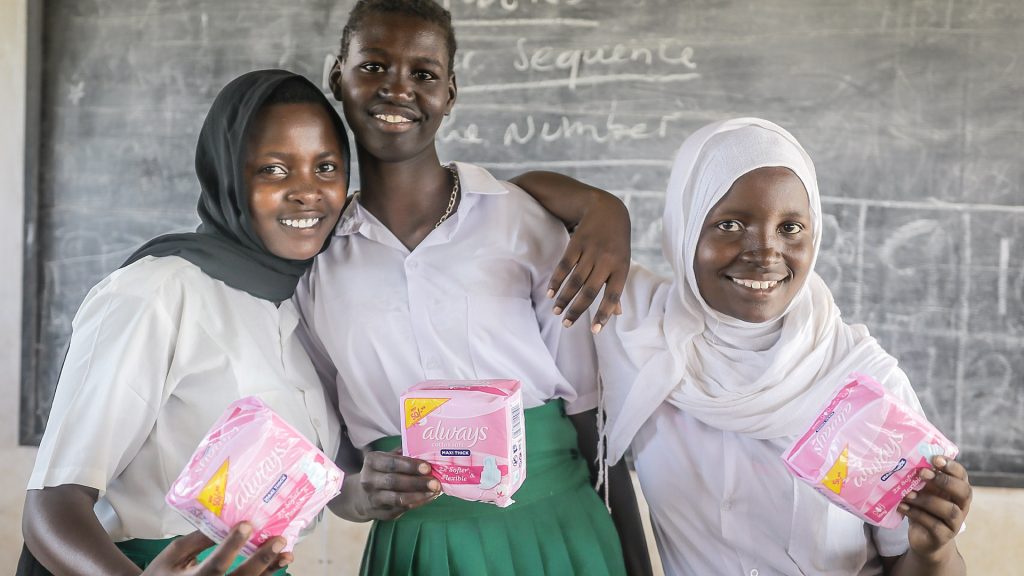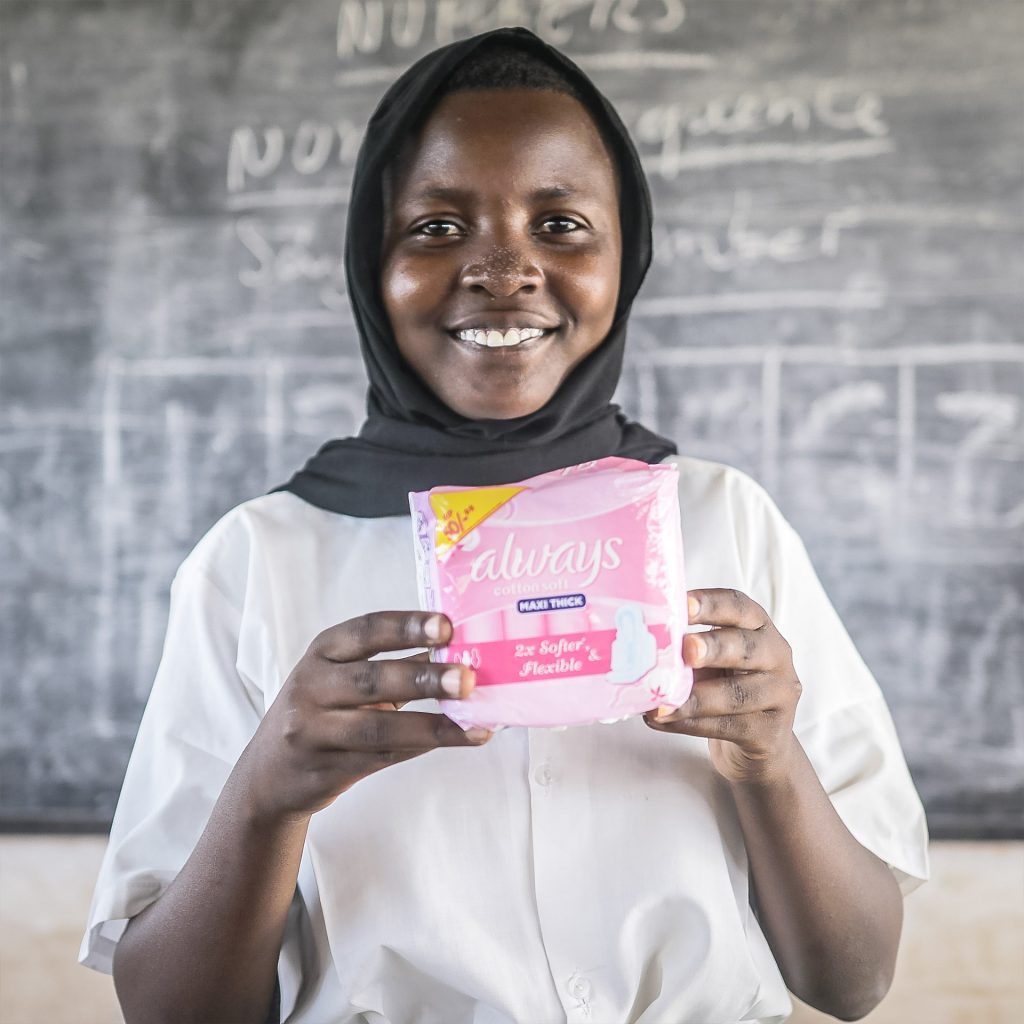a MENSTRUAL HYGIENE KIT CAN SECURE
GIRLS’ EDUCATION IN KENYA
aMENSTRUALHYGIENEKITCANSECUREGIRLS’EDUCATIONINKENYA
Up to one million Kenyan girls miss days of school each month due to menstruation
What would you do if you had to replace your menstrual hygiene products with rags made from old clothes, or if you simply did not own anything that would stop others from noticing the bleeding or odors?
AKIMANA, 18, knows what life is like when menstruation interferes with going to school.
”It’s really stressful to go to school without menstrual hygiene products. I feel so bad, especially when I’m standing in front of the class, if I’ve stained my skirt by accident and my classmates laugh at me,” she says.
Sometimes Akimana skips school because she has no menstrual hygiene products and she feels ashamed to stand out. There are few teenage girls in the world who would not mind going to school while wearing clothes with period blood stains on them.

”Sometimes, when I have no menstrual hygiene products and my classmates find out, they laugh at me and call me dirty. It feels so bad that some girls don’t come to school anymore,” says Mikamsoni, 17.
The classmates’ laughter might seem cruel, but deep down, the problem is actually a lack of education. Roughly every other human being in the world menstruates at some point in their life. At the same time, the topic might be so taboo in the community that periods or the hygiene issues related to them are not talked about, even among mothers and daughters.
”Understanding the menstrual cycle is among the basics of reproductive health, and this information is necessary for both girls and boys. Being open helps combat assumptions such as that periods make girls dirty or weak, or that while menstruating you should refrain from everyday life or even isolate yourself from the rest of the community,” says advocacy expert Merja Färm from Finn Church Aid.

A WHOLE OTHER aspect of periods is the financial side. Disposable menstrual hygiene products may be so expensive that families living in extreme poverty – or about less than 2 euros per day – cannot afford them. In the case of reusable menstrual pads, the problem is that washing the pads is difficult without a proper water supply point.
”If there are no hygiene products available, girls and women use unsuitable and unhygienic rags that are uncomfortable, smelly, and leaky, and at worst may even cause infections,” says Färm.
In a worst-case scenario, girls and women might even resort to using grass, leaves from trees, or sand. Those in a particularly vulnerable position include girls like Latifa and Violeta who live in rural Kenya and in refugee camps.
Finn Church Aid’s fight for girls’ education opportunities includes promoting menstrual hygiene. In our countries of operation, we provide girls with hygiene packages that include menstrual hygiene products, soap, and underpants. Another key part of this work is education regarding good menstrual hygiene that we provide while distributing the hygiene packages. Schools play an important role in this work as well.
”We educate students, teachers, and even the students’ parents on how important it is to enable girls to go to school even during their period,” says Färm.
Being left outside education increases the risk of early marriage and pregnancy, as well as unreasonable amounts of housework. Girls in a particularly difficult position include those who have undergone female genital mutilation and those with a heavy period, Färm emphasises.
After receiving menstrual hygiene packages from her school through the Finn Church Aid project, 16-year-old Micheline from Kenya is happy that she no longer needs to cut up her old clothes to be used as menstrual pads.
”Getting menstrual hygiene products from school has really changed my life. Back when we didn’t get them from school, I had to stay at home during my period, because I was afraid of the shame of getting stains on my school uniform. Now I can go to school regularly, and I feel confident,” says Micheline.

IN KENYA, FCA has distributed menstrual hygiene products to over 5,000 girls through the schools in the Kalobeyei refugee settlement.
In addition, Finn Church Aid has supported schools in its development cooperation projects and during crises by building toilets and water supply points in the school premises. A bathroom door with a lock helps secure privacy, but just building a toilet in the school premises creates security for girls in particular, since they no longer need to look for a place to be away from view. When there are enough water supply points, they can even be used to wash menstrual pads without others watching.
As previously mentioned, about half of the world’s population deals with having a period at some point in their life. It is important not to let something as normal as menstruation stand in the way of girls and women going to school, finding an occupation, earning their own livelihood, and reaching for their dreams.
”Menstruation awareness and hygiene are cost-effective ways to increase girls’ well-being and school enrolment rate, as well as women’s employment and participation in society. In order to rise from poverty, girls and women need to be included as well,” says Merja Färm.
Text: Kaarina Karjalainen